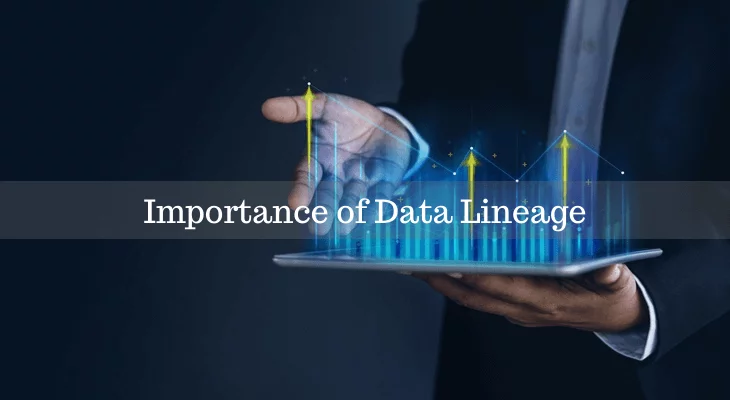In previous blogs, we discussed various open-source data lineage tools, and we have also discussed some of the data lineage examples across different sectors.
Data lineage is a vital cog in the data governance wheel, and we will be covering the importance of data lineage and the benefits of data lineage in this blog.
Importance of Data Lineage:
Data lineage deals with the journey of datasets right from its origins to its end-stage. As human being’s dependence on technology increased, the value of the database began growing.
This increase in the importance of database started influencing business decisions, and it resulted in compromising data privacy & data manipulation, which resulted in decreased data security.
Thus, various countries began introducing several compliance laws.
Most of these compliance laws require the businesses to disclose the sources of how, where, and when they received a particular database.
Hence, the significance of data lineage increased massively. This is one of the significant reasons why data lineage gained importance, but it is not the only reason why maintaining data lineage is essential to organizations.
Data lineage tools allow data scientists to organize and sort out the data more efficiently.
If we take a look at large organizations, they communicate with their data sources through various mediums, and it is difficult to segregate at which stage that prospect, is in a particular system.
Data lineage tools provide the data scientists a simple visual flow with which they can easily assess that information.
Data processing becomes a hassle if you are dealing with a traditional data warehousing model.
Because with the growth in the dataset, data sorting and data processing becomes too complicated, and the activity becomes time-consuming.
Data lineage systems keep a track of dataset from its very origins; this makes it easier to sort out and classify datasets.
As a result, processing of data becomes much simpler and less time consuming with data lineage.
Data lineage tools offer valuable insights that help marketers in their promotional strategies and helps them to improve their lead generation cycle.
These insights include user demographics, user behavior, and other data parameters.
These data values are also useful because they help businesses in gaining a competitive advantage.
Many data scientists face a critical challenge of understanding business terminologies and applying them in the database as per the data terminologies.
Often the business terminologies can be confusing for data scientists as they might be using the same terminology for different functionality.
But, with data lineage tools, data scientists can understand the definitions and the logic behind these terminologies easily and plan & implement them accordingly.
This practice not only clears the confusion between different terminologies, but it can also save time and improve efficiency & effectiveness.
Many a time, there are discrepancies with information on data subjects. Generally, these discrepancies occur at initial stages, but with traditional warehousing methods, it becomes difficult to find out the source and the origins of the error.
But, with the help of data lineage tools, you can find out the root cause of any error easily as these tools keep track of all the entries made pertaining to the data subject.
But, these tools don't offer just that. You can also get a detailed analysis of discrepancies and/or errors and guidelines to prevent these errors in the future.
As we discussed earlier in this blog, it becomes really difficult to handle a huge amount of data, which continually increases with the traditional data warehousing systems.
But data lineage systems are designed to process, extract, and transform big data.
These data lineage systems are easy to deploy and can be scaled to any level in a short period of time. Data lineage tools are also easy to monitor & access.
The mappings and insights provided by these tools can also help data analysts to predict and take preventive measures to avoid bottle-necking of the database in the future.
Also Read:





